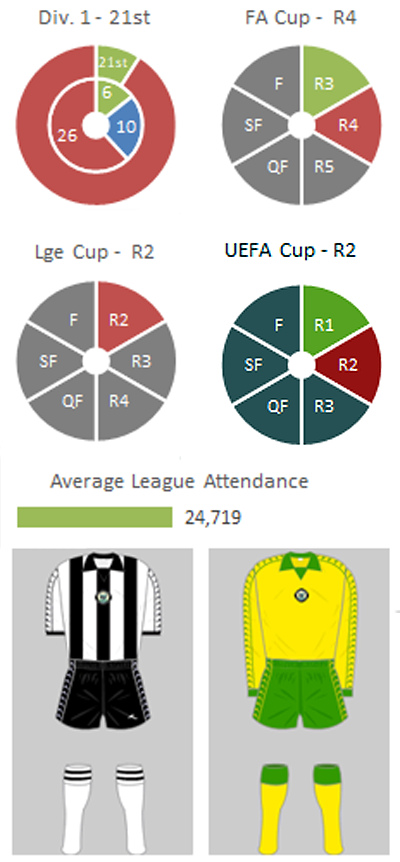
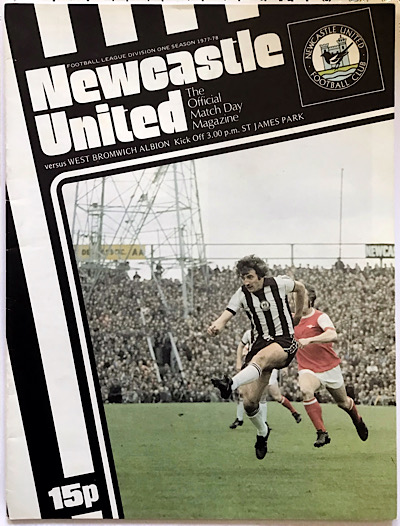
| Division 1 | 21st |
| UEFA Cup | R2 |
| FA Cup | R4 |
| League Cup | R2 |
| Attendance | 24,719 |
| Chairman | Lord Westwood > B Rutherford |
| Manager | R Dinnis > B McGarry |
| Coach | W McFaul > P Morris |
| Captain | G Nulty |
| Top Scorer | M Burns (16) |
A year after qualifying for Europe, United were relegated after a season so disastrous that the BBC devoted an edition of it's "Tonight" programme to "The decline and fall of Newcastle United".
The Magpies were ditched into a relegation position by the third Saturday of the season and they would never again crawl out of it. Dinnis got the sack and was replaced by Bill McGarry, but he could not halt the slide.
United eventually finished in 21st position after gathering a mere 22 points from 42 games; eleven points short of safety and the worst ever total.
An incredible thirty five different players (the most ever at that point) appeared during the season.
The domestic cups provided no relief as Newcastle were defeated at home by Second Division Millwall in the League Cup Second Round and thrashed 4-1 by Third Division Wrexham in an FA Cup Fourth Round Replay.
The European dream turned into a nightmare as a riot marred the away match with Bohemians before their interest was ended by French side Bastia who went on to lift the UEFA Cup after outclassing the Magpies at SJP.
Newcastle failed to win a single League match after winning at Leeds on January 2nd and it is hardly surprising that the fans deserted them in their droves. In those pre mass season-ticket days supporters voted with their feet and only 7,986 bothered to turn up for the last home game
Very few clubs could have achieved such a dramatic turnaround in fortunes and the directors, managers and players all deserved a share of the blame.
Kit images copyright Historical Football Kits and reproduced by kind permission
After beating Leeds in a thrilling game on the first Saturday United recorded a record-breaking 10 defeats in a row before beating Chelsea in mid-October.
A run of 3 wins in December produced a glimmer of hope and when it was followed by a win at Elland Road at the beginning of 1978 an escape looked possible.
But the win at Leeds was to be the last of the season as in their remaining games United drew 8 and lost 11.
| 20/8 | H | Leeds Utd | W | 3-2 | H | |
| 23/8 | A | Liverpool | L | 0-2 | ||
| 27/8 | A | Middlesbrough | L | 0-2 | H | |
| 03/9 | H | WHU | L | 2-3 | H | |
| 10/9 | H | WBA | L | 0-3 | ||
| 17/9 | A | Birmingham | L | 0-3 | ||
| 24/9 | H | Coventry | L | 1-2 | H | |
| 01/10 | A | Ipswich | L | 1-2 | ||
| 05/10 | A | Norwich | L | 1-2 | ||
| 08/10 | H | Derby | L | 1-2 | H | |
| 15/10 | A | Man Utd | L | 2-3 | ||
| 22/10 | H | Chelsea | W | 1-0 | ||
| 29/10 | A | Everton | D | 4-4 | ||
| 05/11 | H | Bristol | D | 1-1 | ||
| 12/11 | A | Wolves | L | 0-1 | ||
| 19/11 | H | Arsenal | L | 1-2 | ||
| 03/12 | H | Leicester | W | 2-0 | ||
| 10/12 | A | QPR | W | 1-0 | ||
| 17/12 | H | Wolves | W | 4-0 | ||
| 26/12 | A | Man City | L | 0-4 | ||
| 28/12 | H | Nottm F | L | 0-2 | ||
| 31/12 | H | Liverpool | L | 0-2 | ||
| 02/1 | A | Leeds Utd | W | 2-0 | ||
| 14/1 | H | Middlesbrough | L | 2-4 | H | |
| 21/1 | A | WHU | L | 0-1 | ||
| 25/2 | H | Ipswich | L | 0-1 | ||
| 04/3 | A | Derby | D | 1-1 | ||
| 11/3 | H | Man Utd | D | 2-2 | ||
| 15/3 | H | Birmingham | D | 1-1 | ||
| 18/3 | A | Chelsea | D | 2-2 | ||
| 24/3 | H | Everton | L | 0-2 | ||
| 25/3 | A | Nottm F | L | 0-2 | ||
| 29/3 | H | Man City | D | 2-2 | ||
| 01/4 | A | Bristol | L | 1-3 | H | |
| 04/4 | A | Coventry | D | 0-0 | ||
| 08/4 | H | Aston Villa | D | 1-1 | ||
| 12/4 | A | WBA | L | 0-2 | ||
| 15/4 | A | Arsenal | L | 1-2 | ||
| 17/4 | A | Aston Villa | L | 0-2 | ||
| 22/4 | H | QPR | L | 0-3 | ||
| 26/4 | H | Norwich | D | 2-2 | ||
| 29/4 | A | Leicester | L | 0-3 |
| W | D | L | F | A | Pts | ||
| 01 | Nottm Forest | 25 | 14 | 3 | 69 | 24 | 64 |
| 02 | Liverpool | 24 | 9 | 9 | 65 | 34 | 57 |
| 03 | Everton | 22 | 11 | 9 | 76 | 45 | 55 |
| 04 | Man City | 20 | 12 | 10 | 74 | 51 | 52 |
| 05 | Arsenal | 21 | 10 | 11 | 60 | 37 | 52 |
| 06 | West Brom | 18 | 14 | 10 | 62 | 53 | 50 |
| 07 | Coventry | 18 | 12 | 12 | 75 | 62 | 48 |
| 08 | Aston Villa | 18 | 10 | 14 | 57 | 42 | 46 |
| 09 | Leeds | 18 | 10 | 14 | 63 | 53 | 46 |
| 10 | Man United | 16 | 10 | 16 | 67 | 63 | 42 |
| 11 | Birmingham | 16 | 9 | 17 | 55 | 60 | 41 |
| 12 | Derby | 14 | 13 | 15 | 54 | 59 | 41 |
| 13 | Norwich | 11 | 18 | 13 | 52 | 66 | 40 |
| 14 | Middlesbrough | 12 | 15 | 15 | 42 | 54 | 39 |
| 15 | Wolves | 12 | 12 | 18 | 51 | 64 | 36 |
| 16 | Chelsea | 11 | 14 | 17 | 46 | 69 | 36 |
| 17 | Bristol City | 11 | 13 | 18 | 49 | 53 | 35 |
| 18 | Ipswich | 11 | 13 | 18 | 47 | 61 | 35 |
| 19 | QPR | 9 | 15 | 18 | 47 | 64 | 33 |
| 20 | West Ham | 12 | 8 | 22 | 52 | 69 | 32 |
| 21 | Newcastle Un | 6 | 10 | 26 | 42 | 78 | 22 |
| 22 | Leicester City | 5 | 12 | 25 | 26 | 70 | 22 |
| UC | 14/9 | A | Bohemians | D | 0-0 | ||
| UC | 28/9 | H | Bohemians | W | 4-0 | ||
| UC | 19/10 | A | Bastia | L | 1-2 | ||
| UC | 02/11 | H | Bastia | L | 1-3 | H |
R1 L1: The match against the Irish part-timers was blighted by serious crowd trouble (prompted by the United fans raising a union Jack) which saw United 'keeper Mahoney struck by a missile thrown from the crowd and - soon after - the players having to leave the field for ten minutes whilst order was restored. Bottles, cans and blocks of wood were thrown and the United dressing room windows were smashed as they waited to return.
R1 L2: The scoreline fails to tell the true story as although Newcastle controlled the game their play was sloppy and their shooting often abysmal bar a four minute period in the second period in which they scored three times.
R2 L1: Dinnis had "never heard of" French club Bastia when United were drawn against them, but he was aware of their Dutch star Johnny Rep. United took the lead early on, but Papi scored twice; the winner literally the last kick of the match.
R2 L2: The chants of "United are back" soon stuck in the throats of the Geordie faithful as Bastia raced into a 2-0 lead within the first 8 minutes and Dinnis admitted that his side have been given "a soccer lesson".
R3: There were six bookings In a bruising encounter and although United took the lead it was a backs-to-the-wall performance for much of the second-half.
R3r: Gale force winds make for farcical conditions at times and Newcastle had to wait until the 86th minute to make the game safe. They deserved their win but had to work hard for it against their far from outclassed "inferiors".
R4: Wrexham were promotion contenders in Division 3 and had only lost twice in their last 26 games. Although the pitch was muddy and greasy it was an open and well-contested game with plenty of fast attacks; the Welshman deservedly earned a replay one minute from time.
R4r: The Magpies went behind in the first minute and Wrexham controlled the game with their positive and purposeful football.
| R2 | 31/8 | H | Millwall | L | 0-2 |
Dinnis persisted with a close passing style and they often started games brightly. But a lack of pace and the bluntness of the attack meant that chances were missed, confidence dropped and mistakes started to creep in. Sides with a pacier and/or more direct approach simply sliced through them.
Despite being given a two-year contract it was an understatement to say that he did not have the full support of the boardroom. What little support he had evaporated with the club's poor form and an eventual outburst by him in which he accused the club of being "Second Rate".
Dinnis was eventually sacked after the home draw with Bristol City which was the cue for Burns, Mahoney and Tommy Craig to put in transfer requests with Gowling, Nulty and Cassiddy all believed to be considering their futures.
The potential replacements thrown into the media hat were a pretty mundane bunch. There were a number of "between jobs" managers: Eddie McCreadie, Bob Stokoe, Bill McGarry. And also some up-and-coming gaffers: Alan Durban, Graham Taylor, Bobby Campbell, George Eastham and former coach Dave Smith.
Southampton's genial geordie Lawrie McMenemy was allegedly the board's first choice but as he was being considered for the vacant England post this really was a non-starter.
When it was revealed that former Manchester United manager Frank O'Farrel had been offered the job it came as a major surprise. Embarrassingly for United he turned them down, preferring to stay with his current employers, Fourth Division Torquay.
Former United hero Stokoe was particularly hurt to be overlooked and to not even be offered an interview. "I would have done it for three months, even six months, for nothing".
Bill McGarry (47) had been sacked by Wolves after they were relegated in 1975-76. He had worked in Saudi Arabia for but was now back in England looking for work. A reknowned disciplinarian he seemed ready for the challenge. "It seems there is a lot of politics played up there - but I do things my way. If any discipline is needed within the club I'll be happy to oblige. I need players with guts (not degrees)".
McGarry attempted to persuade Jackie Milburn to become his right-hand man, but Milburn was only prepared to commit himself on a part-time basis (two days a week).
He watched United lose at home to Arsenal and made a quick assessment of what was required. "Unless I get a front man I've no chance of getting the team out of trouble....we have no target man - nobody to play the ball up to. We played so many short balls in our own half of the field and near our own box that we committed suicide".
The United supporters made their opinions clear as they chanted "We want our Mac back" during the match with reference to the sideburned one sitting it out in the stands due to an indiscretion in Arsenal's previous match. McGarry enquired about his availability, but was given short shrift. He also failed in later bids for Derek Parlane of Rangers, Liverpool's John Toshack and Micky Walsh of Blackpool.
Mcgarry stated he wanted to assess the staff he had before allowing any players to leave and claimed that he'd "wiped the slate clean". He was impressed by the youngsters at the club and stated that they would get more chances to impress. A much tougher training regime was introduced and a code of conduct imposed. One player found himself thrown out of the training ground when he lit-up after a particularly gruelling session.
Three wins in a row and three clean sheets in McGarry's ("the best Xmas Box I have ever had") first games in charge raised hopes that a miracle was indeed on the way; but it was to prove a false dawn.
At the end of January Stoke were after a new manager after they had sacked George Eastham and McGarry was on their shortlist. A native of the Potteries, he still lived in the area and significantly his three year contract was as yet still unsigned. It was rumoured in the press that he might make a quick getaway, but he ended up staying.
The Board was under attack from many quarters, but they were in no mood to relinquish their position. On the contrary, they further entrenched their position by dismissing Dinnis and ridding themselves of the "troublemakers" at the centre of the "player power".
Chairman Westwood put the blame on United's demise on ex-manager Gordon Lee; claiming that the club's problems dated back to his sales of Hibbitt and Macdonald. Lee was quick to respond: "This could be a great club. The supporters are magnificent, superb. It should be the happiest club in the world now. Richard Dinnis and the players rightly took the credit for getting Newcastle into Europe. So why blame me now? What's it got to do with me?"
Their amateurish bungling of the Dinnis appointment during the previous season had left them with a manager that many of them didn't want and were quite happy to undermine. The contractural wrangles with the players resulted in a disaffected squad and no new signings. Their inability to generate sufficient funds to finance new signings and attractive wage deals prevented the club from buying their way out of trouble.
Chairman Westwood had been willing to publicly back Dinnis, but as the losses mounted up he made it clear that the board's patience "was not inexhaustible" and that he expected the players who "got the improved contracts they wanted" to start to "produce the goods".
Dinnis' outburst loaded the guns for the trigger-happy directors and after Burns and Craig responded by demanding transfers they attempted to regain control by gagging all players from talking to the press.
Westwood had become a figure of hate and he was forced to go ex-directory because of constant obscene phone calls and even a bomb hoax. As a result it was no surprise when he attempted to move himself out of the firing line by becoming President with Bob Rutherford taking over as Chairman.
The NUSA were less than impressed with the boardroom changes. "We were expecting that when Lord Westwood announced his intention to resign, that Newcastle united would be entering a new era. What has happened is just a game of musical chairs. Lord Westwood is very firmly still there. This type of kidology is typical of the way the board insult the intelligence of loyal supporters".
| Player | A | S | G |
|---|---|---|---|
| Barker M | 14 | 0 | |
| Barrowclough S | 29 | 2 | 1 |
| Barton D | 12 | 2 | |
| Bird J | 31 | 0 | 2 |
| Blackhall R | 20 | 0 | 2 |
| Blackley J | 20 | 0 | |
| Burns M | 46 | 1 | 16 |
| Callachan R | 11 | 0 | |
| Cannell P | 11 | 0 | 1 |
| Carr K | 11 | 0 | |
| Cassidy T | 21 | 1 | 5 |
| Craig D | 6 | 2 | |
| Craig T | 31 | 0 | 6 |
| Gorry M | 1 | 0 | |
| Gowling A | 20 | 1 | 6 |
| Guy Alan | 1 | 0 | |
| Hardwick S | 9 | 2 | |
| Hudson R | 7 | 1 | 1 |
| Kelly Peter | 10 | 0 | |
| Kennedy A | 29 | 0 | 3 |
| Larnach M | 14 | 0 | |
| MacLean D | 8 | 0 | |
| Mahoney M | 23 | 1 | |
| Martin D | 5 | 6 | 2 |
| McCaffery A | 19 | 1 | 1 |
| McGhee M | 18 | 1 | 3 |
| Mitchell K | 8 | 1 | 1 |
| Nattrass I | 46 | 1 | 3 |
| Nulty G | 11 | 1 | |
| Oates G | 8 | 2 | |
| Parkinson A | 1 | 1 | |
| Robinson S | 7 | 1 | 1 |
| Scott J | 0 | 2 | |
| Smith T | 0 | 1 | |
| Walker N | 13 | 0 |
Total number of games: 51
Total number of players used: 35
| Name | Date | From | Fee |
|---|---|---|---|
| Manners Peter | 07/77 | Professional | |
| Mulgrove Keith | 07/77 | Professional | |
| Robinson Stuart | 07/77 | Murton Colliery | |
| Walker Nigel | 07/77 | Whickam | |
| Blackley John | 10/77 | Hibernians | £100,000 |
| Martin Dennis | 10/77 | Carlisle | £40,000 |
| Larnach Mike | 12/77 | Clydebank | £100,000 |
| Mcghee Mark | 12/77 | Morton | £150,000 |
| Parkinson Andrew | 03/78 | Dynamos Utd | |
| Scott Jamie | 03/78 | Professional | |
| Connolly John | 05/78 | Birmingham | Exchange |
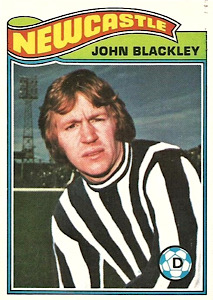
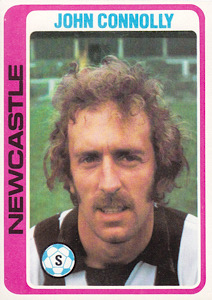
Once the season had derailed Dinnis had neither the wherewithal nor the financial clout to buy his way out of trouble. Dinnis attempted unsuccessfully to buy a whole host of players before eventually signing two. Classy twenty-nine year old Scottish International John Blackley and Carlisle reserve midfielder Dennis Martin. Meanwhile the machinations of the summer had taken their toll and a number of players remained unsettled. Other clubs hovered around like vultures.
As soon as Bill McGarry took over he recognised the need ror a target man, but with an expirienced striker proving elusive two young Scots were signed whom the manager had allegedly never seen play.
| Name | Date | To | Fee |
|---|---|---|---|
| Craig Tommy | 01/78 | Aston Villa | £270,000 |
| Cannel Paul | 02/78 | Washington Diplomats | £40,000 |
| Gowling Alan | 03/78 | Bolton | £120,000 |
| Hudson Ray | 03/78 | Fort Lauderdale | £40,000 |
| Martin Dennis | 03/78 | Mansfield | £25,000 |
| Oates Graham | 03/78 | Detroit Express | £40,000 |
| Barrowclough Stewart | 05/78 | Birmingham | Exchange |
| Chambers Colin | 05/78 | ||
| Mclean David | 05/78 | Carlisle | Free |
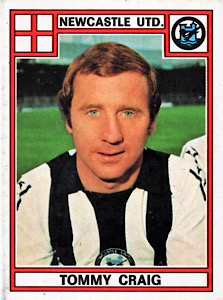
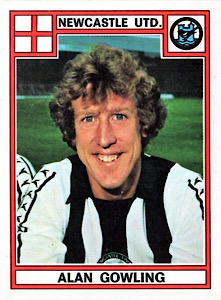
The sacking of Dinnis and McGarry's remit to purge the club of "trouble makers" caused much unrest amongst the players. Despite McGarry's best efforts Tommy Craig was the first to depart with Alan Gowling following soon after. Stewart Barrowclough departing at the end of the campaign.
Youngsters Paul Cannell and Ray Hudson both got their wish to move to the American League. as did Graham Oates.
Tyneside had it's own summer of discontent with nearly all the first team in dispute over the contracts they had been offered. The situation was so bad that a week prior to the first game eleven first team players still had not put pen to paper.
Some players (including Nulty, Gowling, Tommy Craig, Nattrass and Kenneddy) wanted an extra £1000 on their basic wage. Others were not happy with the one year contracts they had been offered (including Burns, Barrowclough, Cassiddy and Player of the Year Mick Mahoney).
The directors originally called the players' bluff and refused to accede to their demands; stating that if they didn't sign then they would simply play the reserves. Then with the new season drawing ever closer the board capitulated. Better contracts were offered (giving them a £230 a week basic wage) and accepted; however irreparable damage had been done.
Pre-season preparations had been disrupted, many players were still not 100% happy with what they had received, the relationship between the players and the directors had deteriorated further and Dinnis' position had been undermined.
No less than thirty five players were used by managers Dinnis, McFaul and McGarry; the most ever used in one season and almost twice as many as had been used in 1976/77.
Although the squad was quite large it lacked quality outside the first eleven and could not withstand a bad run of injuries and/or suspensions and/or loss of form. Therefore when the injury crisis inevitably came too many untried youngsters had to be thrown in.
The squad was not adequately strengthened due to the board's lack of faith in Dinnis, the contractural wrangling during the summer, Dinnis' lack of experience in the cut-throat world of the soccer trade and the lack of available funds.
Despite the fact that the players eventually signed their contracts many of them remained unsettled; this was further exacerbated when Dinnis was sacked.
But the players cannot be absolved of all blame. They had been completely out of order during the previous season over the appointment of Dinnis. And certainly there were a number of occasions during 1977/78 when some players did not appear to be putting in 100% effort.
The Dinnis outburst made it clear that he thought some players had outstayed their welcome and although McGarry was willing to adopt a wait and see approach he had soon changed his mind.
By March McGarry had seen enough: "We are ridiculously overstaffed. The wage bill is astronomical." (There were 54 professionals at the club when McGarry joined). "I need to get rid of about 20 players.. there are youngsters here I've hardly seen play. I need to give them a chance".
He also blasted a number of players for being "riddled with fear". "I can't understand it" he continued "there is no way that a player with Newcastle is going to get the bird if he tries".
In a case of bad timing Jimmy Smith's testimonial took place at the end of the season. A crowd of 17,428 saw a Jim Smith's IX beat the current side 6-3.
As the season unfolded the attitude of the fans changed. Initially they tried to lift the team and Dinnis was full of praise after the 0-3 home defeat against West Ham. "The Leazes End in particular were marvellous in the second half trying to keep us going".
But when the scoreline was repeated a week later in the home game against West Brom. the fans turned. They barracked the players throughout the match, chanted "we want football" and jeered them off the pitch (allegedly) reducing some players to tears.
The arrival of McGarry and a couple of better performances got the fans back on the team's side, but when relegation became a mathematical certainty they voted with their feet. The last home game against Norwich attracted only 7,986. It was the lowest attendance for a League match since World War 1.
Not surprisingly the average attendance slumped by more than a quarter to 25,037.
It was apt that the biggest crowd of the season at SJP was for a match in which Newcastle did not play. A crowd of over 42,000 turned up (with many more locked out) to see Blyth Spartans unluckily beaten by Wrexham.
Even this match brought controversy as the Chronicle reported. "Turnstiles had closed even though there were huge gaps in some parts and many fans - especially in areas of the new stand and the Leazes End - could watch the match without even being pushed."
The club responded by explaining that certain section had to be closed because they had reached their capacity and that announcements were made to guide supporters to open turnstiles. Some supporters decided to gain entry by forcing their way through locked doors and the decision was taken to close all turnstiles.
The home game on March 29th against Manchester City was poignant as it marked the end of an era for the ground as The Leazes End was closed to allow it to be demolished as the first stage of the Phase II ground development plan.
For safety reasons the capacity had already been reduced by 5,000 and the decision was taken to start with the covered Leazes instead of the uncovered Gallowgate because the Popular End was in a worse state.
The plan was to replace it with a new stand similar to the East Stand with paddocks to the front and seating behind. The new paddocks were to be ready for the start of the new season; the 5000 capacity seating areas would "not be completed next season" but would instead "be built in sections as and when possible".
With their usual impeccable timing the club introduced a letters page to the programme to give the fans an "opportunity to air your views". Not surprisingly the state of the club was not reflected in the suspiciously positive tone of the majority of letters that got printed. Only one from Mr. RP Myers really criticised the club and the reply from the editor showed that this was only published to try and turn public opinion against the doubters.
With hooliganism rife at the time it was no surprise that the dire performances of the team were also reflected on the terraces. Fighting regularly broke out at the Leazes End during games, notably during the home defeat against West Brom when there was a pitched battle on the terraces.
Embed from Getty ImagesThe UEFA Cup Tie with Bohemians at Dalymount Park had to be stopped for ten minutes as fans fought with each other. Bottles, blocks of wood and cans were used as missiles and the trouble eventually spilled onto the pitch. United keeper Mahoney had to receive treatment after being hit and the windows in the United dressing room were shattered during the break.
Director James Rush was the centre of controversy when it was alleged that he had sent a letter to the Irish club apologising for the behaviour of the Newcastle fans and suggesting it was they who had started the trouble.
The return leg at St. James' was relatively quiet, but a small smoke bomb was launched from the Leazes.
Some supporters decided that a more civilised form of protest was required and The Newcastle United Supporters Association was born with Alex Gibson as Chairman and Malcolm Dix Vice Chairman.
Businessman Dix had attempted to get on the Board on a number of occasions believing that there was a need for a younger more business orientated board. He suggested that "freemasonary" was being used to block him and accused the board of "making Newcastle a laughing stock".
Dix stressed that NUSA were not looking for direct confrontation "Our aims are simply to make United a successful club. It isn't that now and shows no signs of it becoming successful. They simply wanted "the name of Newcastle United spoken with pride once more".
They wanted the club to issue new voting share capital to bring in cash and new blood into the board. Their campaign started with them issuing leaflets to supporters before the home match with Wolves. "The directors have sole authority regarding the transfer of shares and this would seem to have been kept to movement between a select group".
Their premises were officially opened by Fifties stalwart Frank Brennan in January (McGarry having turned down the job as being politically sensitive). Brennan was highly critical of the club and urged the fans to boycott games to bring about change.
Another former player who publicly criticised the club was Macdonald, but his speech at a Sports Council dinner was not well received.